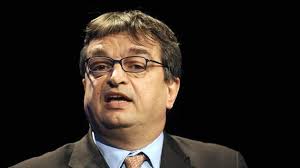By Andrew Warshaw, chief correspondent
February 6 – While the three contenders bidding to unseat FIFA president Sepp Blatter fine-tune their tactics, Jerome Champagne, the first to put his name forward more than a year ago, has strengthened his criticism of Europe for deliberately squeezing him out of the race.
In an interview with Insideworldfootball, Champagne gave a broad insight into the weeks and months leading up to last Thursday’s midnight deadline for nominations from among FIFA’s 209 national federations.
While Prince Ali bin Al-Hussein, Michael van Praag and Luis Figo all gained the required five letters of endorsement, Champagne was left on the sidelines having only secured three. He insists he would certainly have got the other two – including quite possibly from within Europe – were it not for UEFA orchestrating support among his rivals.
Champagne’s views and personality, it has to be said, split opinion. He is admired by many in the game for genuinely and relentlessly trying to redress football’s inequalities and endeavouring to bridge gap between the haves and the have-nots by taking a global approach. Others, however, accuse him of being completely deluded.
Whichever side you are on, the fact is that unlike the other FIFA presidential candidates, Champagne refused to name the federations who supported him – and those he says almost did – prompting questions about his viability. “I don’t want to give you the names but believe me, I tried until the very last moment,” he explains. “I didn’t speak to every federation but a lot of them.”
So when exactly did he know the writing was on the wall, more than a year after launching his bid? “Probably not until the Friday morning. I always believed the letters would come at the last moment.”
Whilst he can certainly be prone to repetition and a refusal to give a straight answer to a straight question, preferring to launch into a diatribe, Champagne is nothing if not passionate about the need to rectify the game’s imbalances.
He admits, however, that he was caught in the middle of a FIFA-UEFA war and that a number of federations whose backing he sought “didn’t want to weaken the Blatter camp”.
He is concerned that the forthcoming campaign will be based on personality clashes rather than meaningful ideas for progress.
“I fear it will be a personalised campaign to evade collective responsibility. All I have seen so far is a list of slogans short on detail from all three UEFA-backed candidates. Luis Figo has not really impressed me. He was a fantastic player but we’re not electing a former player. Prince Ali’s website is full of rhetoric. Van Praag? Slogans.”
Sour grapes, Champagne’s critics would doubtless argue.
Yet asked to provide concrete examples of how UEFA had ganged up on him, Champagne revealed that van Praag, head of the Dutch FA, was initially going to support him.
“In the Christmas issue, van Praag publicly told the Dutch magazine Voetbal International that I was a serious candidate and that there was no reason the Dutch FA would not support me,” said Champagne. “Yet he ended up standing himself.”
Champagne implies that the fact that the three other candidates managed to get their nominations so fast proves there was some kind of deliberate conspiracy.
“People should investigate why those without programmes suddenly appeared out of the blue. I’m not that naive. This is going to be just like past presidential elections, another proxy war. That saddens me.”
He says many of the ideas he first put forward – such as a political-style debate among the contenders – have been copied by the other candidates and denies that even if he had succeeded in toppling Blatter he could not possibly have influenced UEFA matters such as the running of the Champions League and how to redistribute wealth away from an elite few European clubs.
“It’s a global issue when one competition has an impact on the rest of the world. It’s a responsibility of FIFA to say ‘look, we have a problem there’.”
What the Frenchman will do now is open to question. Many within the heirarchy of football administration are adamant that the multi-lingual former diplomat, who spent over a decade at FIFA, will eventually end up working again for Blatter.
Champagne hedges his bets, starting his answer but not finishing it – a common trait. Yet he gives a little hint just the same. Initially he will resume his consulting activities. And then?
“I have spent the last year living on my savings and defending my vision of the game. I campaigned on a dignified platform. What will happen in the coming months and years, I don’t know. If it’s about correcting the imbalances, if it’s about restoring image, why not? But it’s not the topic today.”
“But I’ll you this. Of course we need to make FIFA more transparent but if we have a process where the central topics affecting the game today are not properly discussed, we will have failed.”
Contact the writer of this story at moc.l1751756557labto1751756557ofdlr1751756557owedi1751756557sni@w1751756557ahsra1751756557w.wer1751756557dna1751756557

